Related Research Articles

The politics of Zambia takes place in a framework of a presidential representative democratic republic,whereby the president of Zambia is head of state,head of government and leader of a multi-party system. Executive power is exercised by the government,while legislative power is vested in both the government and parliament. Formerly Northern Rhodesia,Zambia became a republic immediately upon attaining independence in October 1964.

The president of Zambia is the head of state and the head of government of Zambia. The office was first held by Kenneth Kaunda following independence in 1964. Since 1991,when Kaunda left the presidency,the office has been held by seven others:Frederick Chiluba,Levy Mwanawasa,Rupiah Banda,Michael Sata,Edgar Lungu and the current president Hakainde Hichilema,who won the 2021 presidential election. In addition,acting president Guy Scott served in an interim capacity after the death of President Michael Sata.

The prime minister of Zambia was the head of government of Zambia. From 1973 to 1975,Mainza Chona was the first person to hold the position following independence from the United Kingdom.

The United National Independence Party (UNIP) is a political party in Zambia. It governed the country from 1964 to 1991 under the socialist presidency of Kenneth Kaunda,and was the sole legal party in the country between 1973 and 1990. On 4 April 2021,Bishop Trevor Mwamba was elected President of UNIP.

Elections in Zambia take place within the framework of a multi-party democracy and a presidential system. The President and National Assembly are simultaneously elected for five-year terms.

The National Assembly is Zambia's unicameral legislative body. Between 1972 and 1990,Zambia was a one-party state with the United National Independence Party (UNIP) as the sole legal party.

The Speaker of the National Assembly of Zambia is a position established under Article 69(1) of the constitution. The Speaker is elected by members of the Assembly from anyone eligible to be elected to the National Assembly,but cannot be a sitting member.

General elections were held in Northern Rhodesia on 20 and 21 January 1964. There were two voter rolls for the Legislative Council,a main roll that elected 65 seats,and a reserved roll that elected 10. Africans elected the main roll,whilst Europeans elected the reserve roll. Other ethnicities were allowed to choose which roll to be part of. The United National Independence Party won the elections,taking 55 of the common roll seats. Its leader,Kenneth Kaunda became Prime Minister,leading the country to independence in October that year,at which point he became President. Voter turnout was 94.8% for the main roll and 74.1% for the reserved roll.

General elections were held in Zambia on 19 December 1968 to elect the National Assembly and President. The first post-independence polls saw incumbent Kenneth Kaunda retain his post as president,whilst his United National Independence Party,the only party to field candidates in all 105 constituencies,won 81 of the 105 seats in the National Assembly. Voter turnout was 82.5% in the parliamentary election,but 87.1% in the presidential election.

General elections were held in Zambia on 5 December 1973. They were the first elections held since the country was formally declared a one-party state in August,with the United National Independence Party (UNIP) as the only legally permitted party. UNIP leader Kenneth Kaunda was automatically elected to a third five-year term as President,and was confirmed in office via a referendum in which 88.8% of voters approved his candidacy. UNIP also won all 125 seats in the National Assembly. Voter turnout was 39% of the 1,746,107 registered voters for the presidential election,and 33% for the National Assembly election.

General elections were held in Zambia on 12 December 1978. At the time,the country was a one-party state with the United National Independence Party (UNIP) as the sole legal party. UNIP leader Kenneth Kaunda was automatically elected to a fourth five-year term as President,with 80.7% of voters voting to confirm him in office. UNIP also won all 125 seats in the National Assembly. Voter turnout was around 65% in the parliamentary election,but 66.7% in the presidential election.

General elections were held in Zambia on 27 October 1983. At the time,the country was a one-party state,with the United National Independence Party (UNIP) as the only legally permitted party. Its leader,Kenneth Kaunda was automatically re-elected for a fifth term as President,and was confirmed in office with over 95% of the vote. UNIP also won all 125 seats in the National Assembly. Voter turnout was around 63% in the parliamentary election,but 65.5% in the presidential election.

General elections were held in Zambia on 26 October 1988. At the time,the country was a one-party state with the United National Independence Party (UNIP) as the sole legal party. UNIP leader Kenneth Kaunda was automatically re-elected for a sixth five-year term as President with 95.5% of the vote,whilst UNIP also won all 125 seats in the National Assembly. Voter turnout was around 60% in the parliamentary elections,but 58.8% in the presidential elections.

General elections were held in Zambia on 31 October 1991 to elect a President and National Assembly. They were the first multi-party elections since 1968,and only the second multi-party elections since independence in 1964. The United National Independence Party (UNIP),which had led the country since independence,was comprehensively beaten by the Movement for Multi-Party Democracy (MMD). Kenneth Kaunda,who had been president since independence,was defeated in a landslide by MMD challenger Frederick Chiluba in the presidential elections,whilst the MMD won 125 of the 150 elected seats in the expanded National Assembly. Voter turnout was 45%.

General elections were held in Zambia on 18 November 1996 to elect a President and National Assembly. They were boycotted by the main opposition party,the United National Independence Party,together with five other allied parties,following changes to the constitution which they failed to have reversed following a court challenge. The changes imposed a two-term limit on the presidency,required presidential candidates to be born to two Zambian citizens by birth or descent,and required National Assembly candidates to give up their chieftaincy. UNIP believed these changes were specifically aimed at their longtime leader,Kenneth Kaunda,whose parents were Malawian and had previously served as the country's first president from 1964 to 1991. The changes would have also excluded UNIP's vice president,a chief. Subsequently,the ruling Movement for Multi-Party Democracy won a comfortable victory in both elections,taking 131 of the 150 elected seats in the National Assembly,and its candidate,Frederick Chiluba,winning 73% of the vote in the presidential election.

General elections were held in Northern Rhodesia on 30 October 1962,with by-elections for several seats held on 10 December. Although the United Federal Party won the most seats in the Legislative Council,and Northern Rhodesian African National Congress leader Harry Nkumbula had made a secret electoral pact with the UFP,Nkumbula decided to form a government with the United National Independence Party.
Sikota Wina is a Zambian former politician. He was a member of the Legislative Council and the National Assembly and the country's first Minister of Health. He also held the posts of Minister for Local Government and Minister of Information,Broadcasting and Tourism.
Nakatindi Yeta Nganga (1922–1972) was a Lozi aristocrat and Zambian politician. Jointly one of the first women elected to the National Assembly,she was also the country's first female junior minister.
Ester Banda was a Zambian politician. She served as a member of the National Assembly for Roan from 1964 to 1968 and was jointly one of the first elected female MPs in Zambia.
Monica Nanyangwe Chintu was a Zambian politician,one of Zambia's first female politicians.
References
- ↑ Mbuyo Nalumango and Monde Sifuniso (1998) Woman power in politics, Zambia Women Writers Association, p48